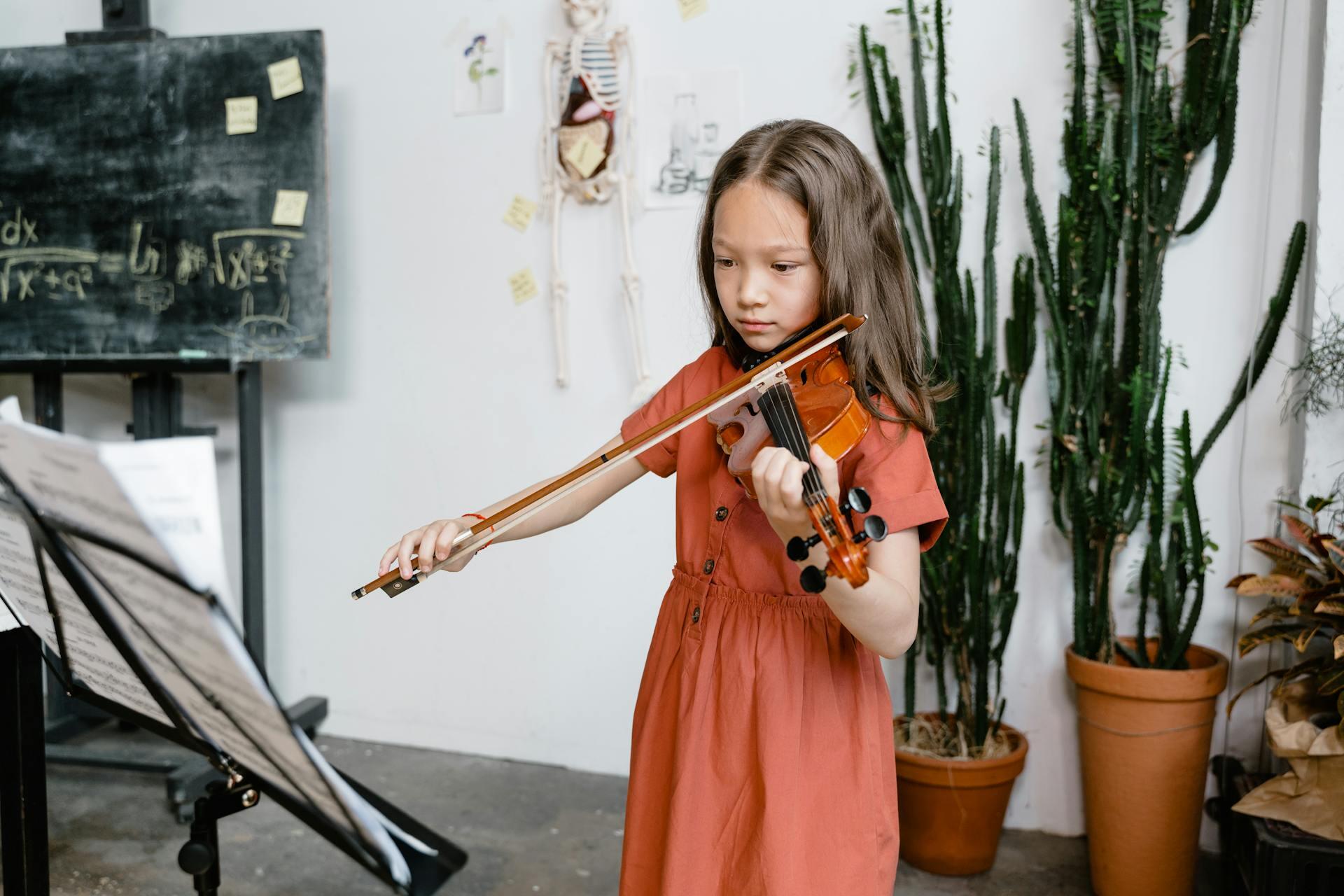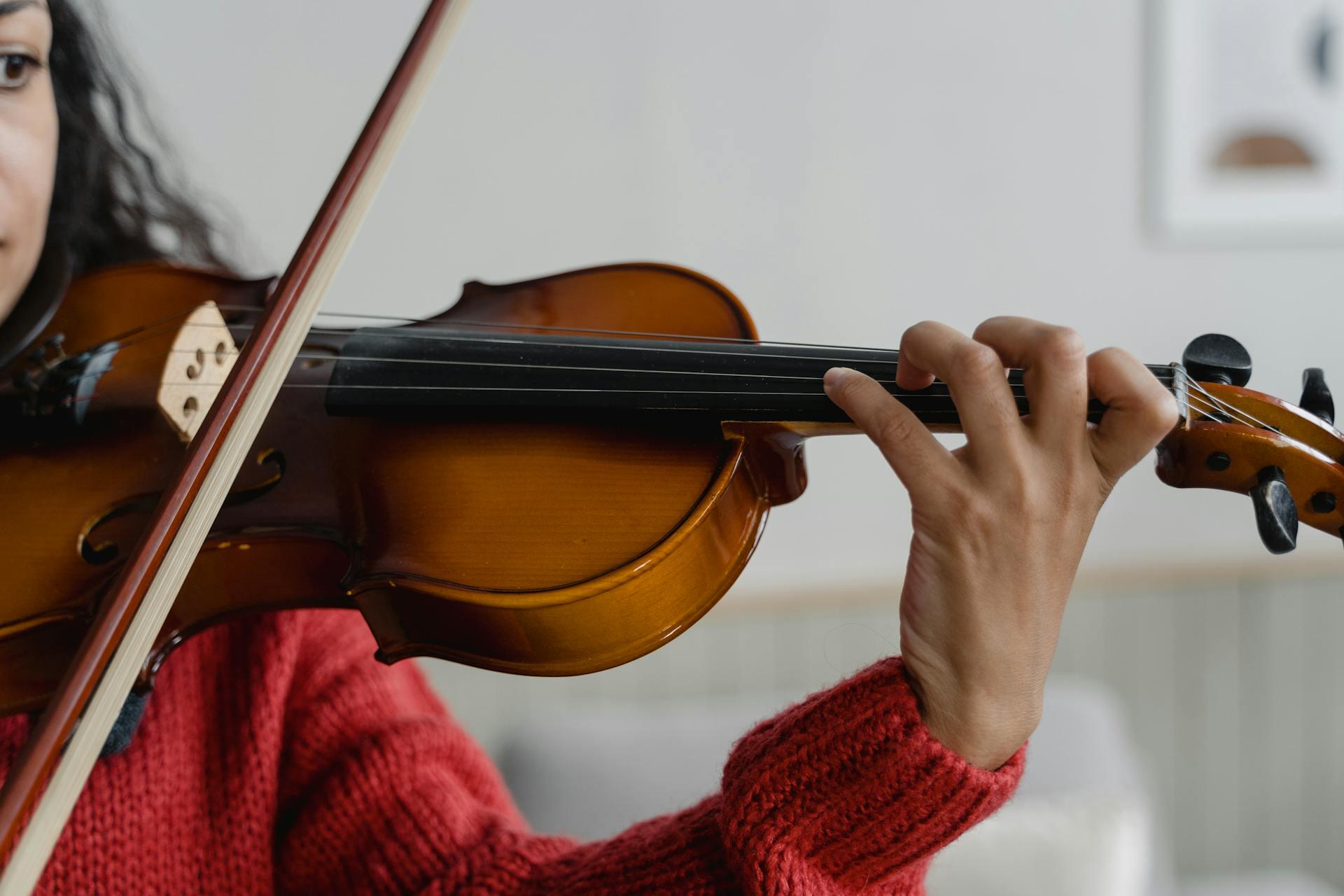Some of the very best music conservatories in the UK and beyond have a lot of interesting history and this is definitely true of the Guildhall School of Music and Drama which dates all the way back to the 1800s and has helped to build the careers of many famous violin and string players as well as actors and other creatives.
In this guide, we’re exploring how to play violin at the Guildhall School of Music and Drama with a focus on those who aspire to play strings and specifically violin at the school. Those who want to reach the pinnacle of their instruments may need to find a way to work out what the very best option is for them, and this could mean a lot of interviews and open days at top conservatories. In London, there are options including the Royal Conservatory of Music to consider along with more modern options like the Guildhall School.

About The Guildhall School of Music and Drama
The Guildhall School of Music and Drama, nestled in London’s iconic Barbican Centre, is a world-renowned conservatoire offering exceptional training in music, drama, and production arts. Founded in 1880, it has become a beacon for aspiring musicians, including those focusing on violin and strings. With over 1,000 students hailing from 70 countries, the school provides a dynamic and diverse artistic environment.

For violinists and string players Guildhall stands out as a leading school. It has a long track record of students for vibrant careers in performance. Students benefit from access to world-class facilities including state-of-the-art performance spaces and practice rooms. Individual instruction, chamber music coaching, and orchestral training are also parts of the curriculum and the idea is to make sure students have no lack of knowledge when they graduate.
Guildhall's unique location within the Barbican also helps bring collaboration with elite partners like the London Symphony Orchestra and the Barbican Centre itself. This link enables students to engage with professionals at the pinnacle of their fields through masterclasses and even performance opportunities.
Ranked among the world’s top five performing arts institutions in the QS World University Rankings (2024), Guildhall has an impressive legacy of string alumni. The Royal Conservatory of Scotland and many other UK conservatories regularly score highly on these sorts of rankings, too. Graduates frequently secure positions in prestigious orchestras and chamber groups or pursue musical careers.
Amidst a lot of choices in England, Scotland and elsewhere in the UK for conservatories, this one is undeniably high on the list. Guildhall provides an amazing foundation for string players aiming to make their mark on the global stage and be the very best. If you’re practising away from London, try googling violin lessons near me can also help you build the standard needed for auditions.
BMus – Bachelor of Music Honours Degree at Guildhall
Just like at other conservatories including the Royal Conservatoire, people can choose to study for an undergraduate degree at the school. A degree remains one of the best ways for people to prove they have been through rigorous studies and that they truly know their stuff.
I feel so fortunate to have the opportunity to study with such respected musicians and forward-thinking teachers, and to have access to such beautiful performance spaces. The exposure we receive to the arts industry is better than I could have ever imagined and the inter-disciplinary opportunities that Guildhall provides are unparalleled. At Guildhall we are training to be artists, not just musicians.
– Nicole Petrus Barracks, BMus Jazz

Guildhall School's BMus Degree Programs
Guildhall School of Music and Drama’s Bachelor of Music (BMus) program sets the stage for aspiring musicians to hone their craft at the highest level. Designed for performers, composers, and electronic musicians, this program emphasises one-to-one tuition across a broad range of disciplines… including strings!

The program is built around the Principal Study (strings), which accounts for at least two-thirds of the curriculum. Students benefit from a minimum of 30 individual lessons annually with esteemed professors, alongside over 100 hours of departmental classes, workshops, and collaborations with prominent artists. Performance opportunities abound, with access to world-class venues and partnerships with leading organisations like the Barbican, the London Symphony Orchestra, and the BBC Symphony Orchestra.
The Structure of the Program
Years 1 and 2 focus on establishing a solid foundation in musicianship and critical skills. Principal Study is complemented by core modules such as Professional Studies 1, which delves into performance psychology, improvisation, and communication. A conducting course is added in Year 2, alongside the option to explore electives after completing foundational musicianship.

Years 3 and 4 prioritise further development in the Principal Study while encouraging specialisation through advanced electives. Students can tailor their studies with a mix of academic and practical options, ensuring a path toward their musical goals with a focus on string instruments. It is also possible within the organisation to specialise in more than one instrument.
Guildhall’s Academic Studies department supports students in integrating theoretical and practical skills. A combination of core subjects and electives allows individuals to explore personal interests and refine their expertise.
There is a lot of theory in all of the courses from top conservatories but there are also a lot of opportunities to play.
Guildhall’s BMus program is designed to nurture the next generation of exceptional musicians. For those preparing outside the capital, searching violin lessons near me can be a practical way to sharpen technique before applying.
Other Ways to Learn How to Play Violin at the Guildhall School of Music and Drama
Like other top universities and music schools including the Royal Academy of Music, there are a lot of ways people can learn how to play violin besides the actual degree courses and even support for younger learners.

Guildhall hosts summer schools that cater to a wide range of musicians, including string players. These programs are intensive and provide participants with opportunities to refine their technique, engage in ensemble playing, and work with Guildhall's distinguished faculty. Summer schools often include masterclasses, workshops, and performance opportunities, making them a great choice for learners at various skill levels.
Junior Guildhall
For younger musicians, Junior Guildhall offers pre-conservatoire training for students aged 4–18. This program includes individual lessons, ensemble practice, and music theory classes, all designed to nurture the talent of budding violinists and other instrumentalists.
Short Courses and Workshops
Throughout the year, Guildhall organises short courses and workshops tailored to different musical interests and levels of expertise. These sessions often focus on specific aspects of performance, technique, or interpretation and may include collaborations with renowned guest artists.
Alumni
Guildhall London University has seen a lot of people attend with some huge ambitions in the world of music as well as acting. The violin alumni from the school are very impressive and many people have gone on to achieve impressive feats since leaving.
Anthony Marwood
Anthony Marwood is celebrated as one of today’s most influential violinists, equally at home as a soloist and director. His collaborations span the whole world including featuring partnerships with ensembles like the Academy of St Martin in the Fields and the Australian Chamber Orchestra. Esteemed conductors such as Valery Gergiev and Marin Alsop have shared the stage with him, while composers like Thomas Adès and Samuel Carl Adams have crafted violin concertos specifically for his artistry.
Marwood’s career highlights include premieres of major works like Adès’ Concentric Paths, performed at the BBC Proms, and an expansive discography of over 30 recordings on Hyperion Records. His recent releases, including Schumann’s violin sonatas on Wigmore Live, have seen him gain a lot of critical acclaim. A past recipient of the Royal Philharmonic Society’s Instrumentalist of the Year award, he also co-directs the Peasmarsh Chamber Music Festival. Marwood performs on a 1736 Carlo Bergonzi violin, an instrument as exceptional as his career.
Tasmin Little
Tasmin Little is a violinist who attended the school and has been met with global acclaim. Her illustrious career has taken her to virtually every part of the globe, performing with legendary orchestras like the Berlin Philharmonic, Royal Philharmonic, and Seattle Symphony. Her tour with Sir Simon Rattle and the Berlin Philharmonic in 2003 drew glowing praise.
Renowned for her dual roles as soloist and director, Tasmin debuted as a conductor with the London Mozart Players in 2008. She also premiered Roxanna Panufnik’s Four World Seasons during the cultural build-up to London’s 2012 Olympics, showcasing her commitment to contemporary music and becoming one of the best-known violinists working today.
Tasmin’s groundbreaking The Naked Violin project brought classical music to wider audiences, earning her the Classic FM Gramophone Award for Audience Innovation in 2008. Her 25-album discography spans beloved composers like Brahms and Bruch to contemporary voices like Arvo Pärt, cementing her place as a vibrant force in classical music.
Preparing For Studies With Superprof
Superprof can provide people with a lot of different ways to study violin and is welcoming for beginners as well as the kind of musicians who may already have grades and be looking to get into the best universities and conservatoires in the UK.
If you are considering the Guildhall School of Music then it is a good idea to make sure you’re in the best possible condition to take your auditions. These kinds of schools are very difficult to get into unless you have a high level of ability and are committed to learning. Our tutors can help you to maximise your potential as a strings player, whether you’re looking for violin lessons near me or preparing for London auditions.
Summarise with AI:















